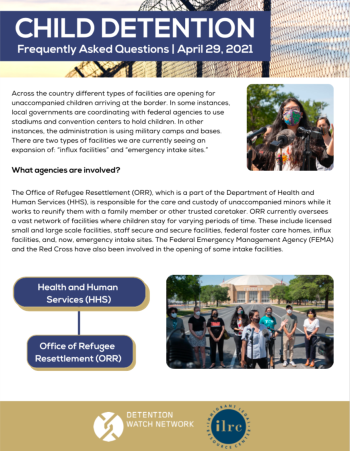
This resource, co-written with Detention Watch Network, answers common questions about the increased numbers of unaccompanied children arriving at the border and the government’s opening of “influx facilities” and “emergency intake sites” in response. It also provides guidance for responding to a new facility opening in your community.
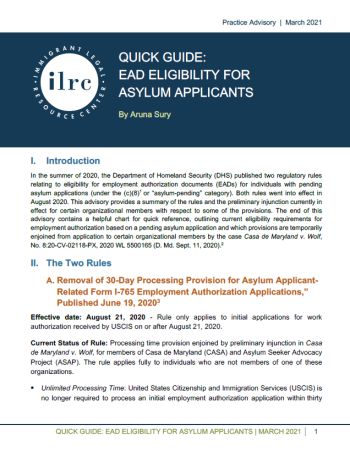
In the summer of 2020, the Department of Homeland Security (DHS) published two regulatory rules relating to eligibility for employment authorization documents (EADs) for individuals with pending asylum applications. Both rules went into effect in August 2020. This advisory provides a summary of the rules and the preliminary injunction currently in effect for members of Casa de Maryland (CASA) and Asylum Seeker Advocacy Project (ASAP). The end of this advisory contains a helpful chart for quick reference, outlining current eligibility requirements for an EAD based on a pending asylum application, and which provisions are temporarily enjoined by the case Casa de Maryland v. Wolf, No. 8:20-CV-02118-PX, 2020 WL 5500165 (D. Md. Sept. 11, 2020), for certain organizational members.
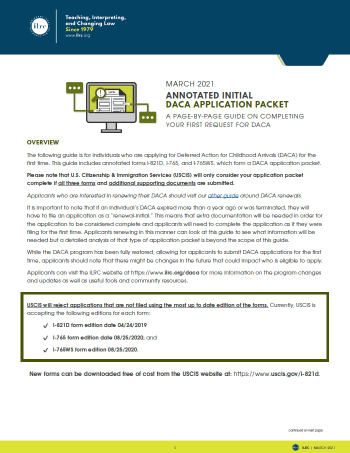
The ILRC’s DACA Team has put together a page-by-page form guide for anyone looking to apply for Deferred Action for Childhood Arrivals (DACA) as an initial request. This annotated community resource provides insights into many of the questions asked of recipients when completing the forms needed to make up a complete application packet (forms I-821D, I-765, and I-765WS). As stated in the document, it is important that any individual completing their forms ensures that they are using the most up-to-date forms USCIS offers – otherwise they will reject your submission.
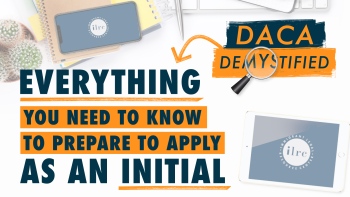
With USCIS now accepting requests for DACA from individuals who have never had DACA, it's VITAL that we understand how to put our best foot forward when compiling evidence documents and application forms. In this video Staff Attorney Veronica Garcia and Legal Outreach Coordinator Abraham Bedoy walk through everything you need to know to prepare to submit your initial application packet!

California immigrants who file taxes may now receive cash from the California Earned Income Tax Credit (CalEITC). During COVID-19, immigrant families need support, and filing taxes may mean cash benefits for qualifying families. This community resource is designed to help answer the most common questions immigrant communities may have on the CalEITC. For more information on the CalEITC, visit CalEITC4Me.org.
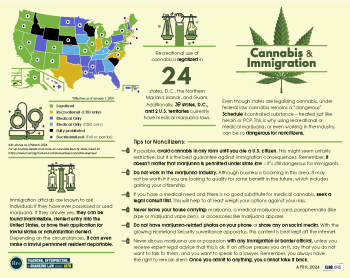
Despite new state laws legalizing cannabis for recreational use, archaic U.S. drug laws still classify marijuana as federally illegal. Because immigration is governed by federal law, this means that noncitizens may face serious problems down the line if they are not aware of how their experiences with cannabis could impact their immigration journey. This video and accompanying infographic detail the specific risks associated with the use or possession of cannabis and/or industry employment.

This resource briefly reviews the February 18, 2021 interim ICE Memo issued by Acting Director Tae Johnson regarding how ICE will carry out DHS enforcement priorities. The new ICE guidance, effective immediately, will remain in effect until DHS Secretary Alejandro Mayorkas issues new DHS enforcement guidelines. This resource covers applicable enforcement actions, a review of the described enforcement priorities, and potential advocacy opportunities.

What are sheriffs, what powers do they have, and how are they involved in immigration enforcement? This short fact sheet helps explain the role and power of sheriffs and their engagement with ICE.
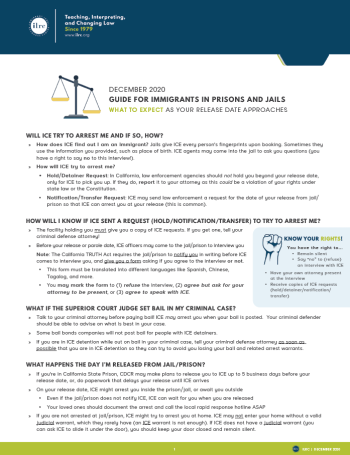
This one-pager goes over basic Know Your Rights information for immigrants incarcerated in California prisons. It includes suggested contact information for families and community members in need of immigration screening.
